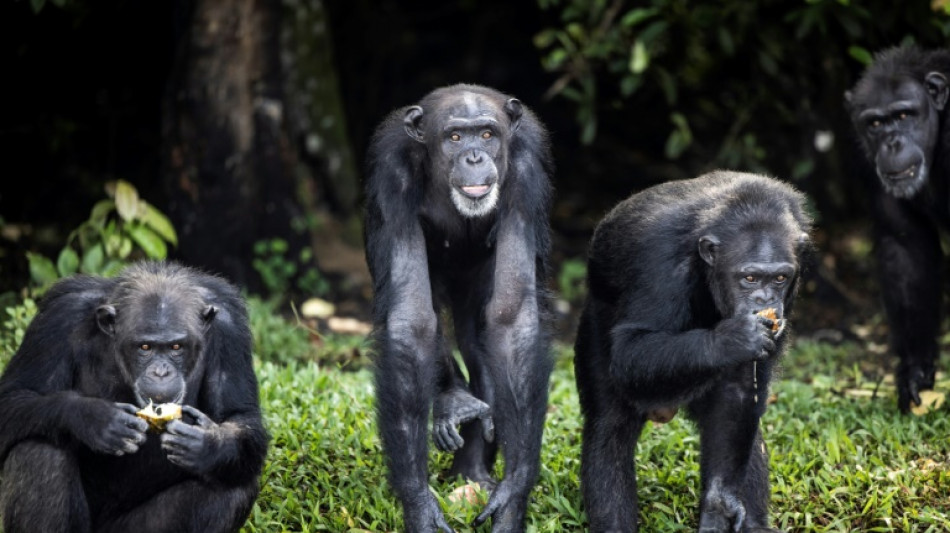
-
 Asian markets edge up but uncertainty rules ahead of Trump tariffs
Asian markets edge up but uncertainty rules ahead of Trump tariffs
-
Nintendo's megahit Switch console: what to know

-
 Nintendo to unveil upgrade to best-selling Switch console
Nintendo to unveil upgrade to best-selling Switch console
-
China practises hitting key ports, energy sites in Taiwan drills

-
 Oil, sand and speed: Saudi gearheads take on towering dunes
Oil, sand and speed: Saudi gearheads take on towering dunes
-
All eyes on Tsunoda at Japan GP after ruthless Red Bull move

-
 'Image whisperers' bring vision to the blind at Red Cross museum
'Image whisperers' bring vision to the blind at Red Cross museum
-
Hay shines as New Zealand make 292-8 in Pakistan ODI

-
 Other governments 'weaponising' Trump language to attack NGOs: rights groups
Other governments 'weaponising' Trump language to attack NGOs: rights groups
-
UK imposes online entry permit on European visitors

-
 How a Brazilian chief is staving off Amazon destruction
How a Brazilian chief is staving off Amazon destruction
-
Meme politics: White House embraces aggressive alt-right online culture

-
 China launches military drills in Taiwan Strait
China launches military drills in Taiwan Strait
-
US senator smashes record with 25-hour anti-Trump speech

-
 Brazil binman finds newborn baby on garbage route
Brazil binman finds newborn baby on garbage route
-
US senator smashes record with marathon anti-Trump speech

-
 Trump advisor Waltz faces new pressure over Gmail usage
Trump advisor Waltz faces new pressure over Gmail usage
-
Niger junta frees ministers of overthrown government

-
 Trump set to unleash 'Liberation Day' tariffs
Trump set to unleash 'Liberation Day' tariffs
-
Boeing chief to acknowledge 'serious missteps' at US Senate hearing

-
 Real Madrid hold Real Sociedad in eight-goal thriller to reach Copa del Rey final
Real Madrid hold Real Sociedad in eight-goal thriller to reach Copa del Rey final
-
Nuno salutes 'special' Elanga after stunning strike fires Forest

-
 PSG survive scare against Dunkerque to reach French Cup final
PSG survive scare against Dunkerque to reach French Cup final
-
Sundowns edge Esperance as crowd violence mars quarter-final

-
 Nottingham Forest beat Man Utd, Saka scores on Arsenal return
Nottingham Forest beat Man Utd, Saka scores on Arsenal return
-
Elanga wonder-goal sinks Man Utd as Forest eye Champions League berth

-
 Stock markets mostly advance ahead of Trump tariffs deadline
Stock markets mostly advance ahead of Trump tariffs deadline
-
US movie theaters urge 45-day 'baseline' before films hit streaming

-
 Saka scores on return as Arsenal beat Fulham
Saka scores on return as Arsenal beat Fulham
-
Third-division Bielefeld shock holders Leverkusen in German Cup

-
 Ball-blasting 'Torpedo bats' making waves across MLB opening weekend
Ball-blasting 'Torpedo bats' making waves across MLB opening weekend
-
Newsmax shares surge more than 2,000% in days after IPO

-
 Thousands of Hungarians protest against Pride ban law
Thousands of Hungarians protest against Pride ban law
-
GM leads first quarter US auto sales as tariffs loom

-
 Tesla sales tumble in Europe in the first quarter
Tesla sales tumble in Europe in the first quarter
-
No 'eye for an eye' approach to US tariffs: Mexico

-
 NFL club owners back dynamic kickoffs, delay tush push vote
NFL club owners back dynamic kickoffs, delay tush push vote
-
Trump 'perfecting' new tariffs as nervous world braces

-
 Trump nominee says to press UK on Israel arms
Trump nominee says to press UK on Israel arms
-
French court says Le Pen appeal ruling could come before presidential vote

-
 The battle to control assets behind Bosnia crisis
The battle to control assets behind Bosnia crisis
-
Prabhsimran powers Punjab to IPL win over Lucknow

-
 Mass layoffs targeting 10,000 jobs hit US health agencies
Mass layoffs targeting 10,000 jobs hit US health agencies
-
Tiger's April Foolishness: plan to play Masters just a joke

-
 Myanmar quake toll passes 2,700, nation halts to honour victims
Myanmar quake toll passes 2,700, nation halts to honour victims
-
Turkish fans, artists urge Muse to cancel Istanbul gig

-
 US seeks death penalty for accused killer of insurance CEO
US seeks death penalty for accused killer of insurance CEO
-
UK govt moves to block sentencing guidelines for minority defendants

-
 Trump puts world on edge as 'Liberation Day' tariffs loom
Trump puts world on edge as 'Liberation Day' tariffs loom
-
Swedish journalist jailed in Turkey kept 'isolated': employer


Scientists produce chimp genetic map to combat trafficking
Scientists have produced the first genetic map of chimpanzees in the wild, offering a detailed reconstruction of the endangered species' past migrations, and a new tool to combat illegal trafficking.
The genomic catalogue, which includes 828 individuals from across their vast African range, can now be used to link kidnapped chimpanzees -- or their meat and body parts -- to their place of origin within 100 kilometers.
The results of the years-long research project was published Wednesday in the journal Cell Genomics.
First author Claudia Fontsere of the Institute of Evolutionary Biology in Spain told AFP: "If we can know the genetic diversity of this endangered species, and its past demographic history...this can help design a better conservation plan."
DNA samples were collected from thousands of chimp droppings as part of the Pan African Program at 48 locations across central and western Africa.
Fecal samples are a useful way to study endangered species because they allow for extensive collection with minimal interference to the animals.
But they also present technical challenges because they contain only trace amounts of host DNA.
To overcome these constraints, the team applied a new DNA sequencing technique called "target capture" that was first used to study Neanderthals whose remains have been degraded over thousands of years.
This allowed them to discover 50 percent more variants on a particular chromosome -- number 21 -- than had previously been found, and from this infer past gene flow between chimpanzee populations, plugging gaps in scientific understanding.
Previously, only 59 whole chimpanzee genomes had been sequenced, mainly from captive animals with limited information about their origin.
- Complex migrations -
Just like humans, chimps have complex migration histories, and the new research allowed the scientists to peer back over the past 100,000 years at a new level of detail.
"There has been a lot of debate on whether the four chimpanzee subspecies truly diverged from one another or whether there has been persistent gene-flow between them," co-lead author Mimi Arandjelovic of the Max Planck Institute for Evolutionary Anthropology told AFP.
"We were able to show, using different analyses methods that look at very old and more recent variation, that the history is complex, much like that of our own species."
The team learned that the chimpanzee subspecies were separated in the past, but also experienced periods of genetic exchange -- helping explain why past studies that tried to reconstruct chimps' evolutionary history came to differing conclusions.
They found geographical barriers like lakes and rivers also created genetic barriers between subspecies as well as between communities, and discovered new insights about periods when chimps cross bred with bonobos.
Importantly, they confirmed there was a high level of connectivity between Western chimpanzees, underscoring the need to preserve connections between forests across Western Africa, said Arandjelovic.
Fontsere explained the genetic map could help pinpoint where illegally trafficked chimps had come from.
Though reintroducing the chimps to the wild is a fraught task because of the animals' complex social structure, research has shown they do better when placed in a sanctuary near their place of origin.
"It can help law enforcement to look at the more probable routes, we can trace it back," said Fontsere.
They next hope to improve the genetic map with more samples, and, having proved that fecal DNA is a viable option, extend its use to study other primates.
A.Mahlangu--AMWN



